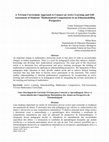Conference Presentations by Emmanuel Chukwuebuka Umeh

A Trivium Curriculum Approach to Connect an Active Learning and Self-Assessment of Students' Mathematical Competencies in an Ethnomodelling Perspective, 2022
An important change in mathematics instruction needs to take place in order to accommodate change... more An important change in mathematics instruction needs to take place in order to accommodate changes in student populations. There is a need for pedagogical action that enhances students' knowledge and develops their mathematical competencies. The main goal of this theoretical article is to determine how self-assessment and active learning encourages the building of mathematical competencies by applying an ethnomodelling perspective. The integration of these pedagogies helps educators to meet specific student needs and to achieve desired learning outcomes that may help them to become active participants in the classroom. This context enables ethnomodelling to develop mathematical competencies by incorporating an active learning and self-assessment in its pedagogical action by integrating the trivium curriculum in the teaching and learning of mathematics.
ECTIVENESS OF ACTIVE LEARNING AND SELF ASSESMENT OF FIRST YEAR MIDDLE SCHOOL STUDENTS' MATHEMATICAL COMPETENCIES: AN ETHNOMODELLING APPROACH, 2021
The reason for this study was on the growth of ethnic and linguistically diverse student populati... more The reason for this study was on the growth of ethnic and linguistically diverse student populations in schools. An important change in mathematics instruction needs to take place in order to accommodate changes in student populations, thus there is a need of a pedagogical tool that will enhance cognition and build mathematical competencies. Therefore, the main goal of this research is to find out how self-assessment and active learning can build learners mathematical competencies using an ethnomodelling approach. The major finding of this research will be to accomplish equality among students, thus incorporating ethnomathematics into lessons. In this regard, mathematical knowledge will to be made equal for all students.

EVALUATING THE USE OF DIGITAL TECHNOLOGY IN TEACHING AND LEARNING OF MATHEMATICS IN FEDERAL UNIVERSITIES IN NIGERIA, 2022
The purpose of the study was to evaluate the use of digital technology in teaching and learning o... more The purpose of the study was to evaluate the use of digital technology in teaching and learning of Mathematics in Federal Universities in Nigeria. To research questions and two hypotheses guided the study. The study adopted a descriptive survey research design. A total 176 respondents which are made up of 76 Mathematics teachers and 100 students were sampled for the study. A structured questionnaire validated by three lecturers was used for data gathering with reliability coefficient of 0.87 using Cronbach Alpha Coefficient method. Mean and standard deviation were used to answer research questions while t-test statistic was used to test the null hypotheses. It was found out that only few digital technologies like Microsoft Mathematics, internet connection and broadband communication, interactive whiteboard and power point, data handling software and dynamic statistical tools like SPSS, MATLAB, video projector and tablets, smart phones and social networking were available while others are not available. It was also discovered that the available digital technologies were not adequately utilized in teaching and learning except graphic calculator and tablets, smart phones and social networking. Employing staff by merit, Government statutory increase in funding of digital technology facilities in school, attending conferences, seminars and workshops based on computer training, internet operation and digital technology by teachers among others were recommended for improvement

GIRL CHILD MATHEMATICS EDUCATION: AN IMPERATIVE FOR WOMEN EMPOWERMENT AND SUSTAINABLE DEVELOPMENT, 2017
The important role that women have to play in achieving sustainable and equitable development is ... more The important role that women have to play in achieving sustainable and equitable development is a global outcry. As such, this study investigated girl child mathematical education as an imperative for women empowerment and sustainable development in SouthEastern Nigeria. Survey research design was used for the study. Two research questions were answered and one null hypothesis tested using Chi-Square statistic. The instrument for data collection was a questionnaire titled:"Perceived Influence of Mathematics Education on Sustainable Development of Girl Child Questionnaire" (PIMESDGCQ) designed using modified Likert scale and validated by three experts in instrument construction. The instrument had a reliability coefficient of 0.83 and was administered to a simple randomized sample of 201 male and female respondents in the study area. The results of data analysis using simple percentages revealed that, to high extent mathematics education students Mothers' higher level of education could be a role model for their children (girl child) to accomplish high levels of achievement in mathematics courses. It was recommended among other things that innovative instructional approaches and techniques should be developed to ensure that students especially the girl child become successful mathematics learners for empowerment and sustainable development.









Uploads
Conference Presentations by Emmanuel Chukwuebuka Umeh